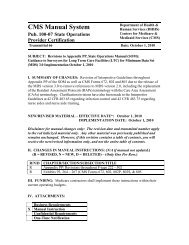LOUISIANA Community Mental Health Services Block Grant ...
LOUISIANA Community Mental Health Services Block Grant ...
LOUISIANA Community Mental Health Services Block Grant ...
Create successful ePaper yourself
Turn your PDF publications into a flip-book with our unique Google optimized e-Paper software.
HOUSING SERVICES<br />
FY 2011 - ADULT PLAN<br />
OMH has recently been combined with the Office for Addictive Disorders to form the new Office<br />
of Behavioral <strong>Health</strong> in an effort to utilize strengths and services of each to effectively address the<br />
needs of mental health and addictive disorders jointly. As new methodologies and strategies are<br />
used to redesign the mental health system of care to engage mental health and other co-occurring<br />
disorders with a Housing First model, it is important to realize that appropriate support services are<br />
essential to this transition. The overall framework of the Housing First Model is that housing is a<br />
necessity and the primary need is to obtain housing first without any pre-conditions to services. The<br />
impact for prevention of the causes that created homelessness should be addressed with a client-<br />
centered approach to sustain homeless and at-risk homeless populations from repeating cycles of<br />
homelessness. Moreover, housing is a basic right, and should not be denied to anyone, even if they<br />
are abusing substances or refusing mental health treatment services. Housing First is endorsed by<br />
The United States Department of Housing and Urban Development and considered to be an<br />
evidence-based practice and a solution to addressing the chronically homeless.<br />
The Olmstead Decision of 1999 is a critical legal victory and supports the right of institutional<br />
mental health consumers and other disability populations to have access to housing and support<br />
services that is necessary to sustain community treatment and services after reaching treatment<br />
objectives. Unjustified institutionalization violates the ADA and to that end creates a pathway to<br />
therapeutic residential housing. With employment services described elsewhere, the MHR,<br />
Intensive Case Management, ACT and FACT programs are very involved in assisting consumers<br />
and families with opportunities to secure and maintain adequate housing. Furthermore, in keeping<br />
with the use of best practices and consumer and family choice OBH has a strong commitment to<br />
keeping families together and to increasing the stock of permanent supportive housing; and<br />
consequently has previously withstood pressure to fund large residential treatment centers. Instead,<br />
effort and dollars have been put into Family Support <strong>Services</strong>, housing with individualized in-home<br />
supports, and other community based services throughout the state. The consumer care resources<br />
provide highly individualized services that assist families in their housing needs. OBH, in<br />
partnership with other offices in DHH, disability advocates, and advocates for people who are<br />
homeless, has actively pursued the inclusion of people with disabilities in all post-disaster<br />
development of affordable housing. These efforts resulted in a Permanent Supportive Housing<br />
(PSH) Initiative which successfully gained a set aside of 5% of all units developed through a<br />
combination of disaster-related housing development programs (including Low Income Housing<br />
Tax Credits) targeted to low income people with disabilities. Congress approved funding for 3,000<br />
rental vouchers to go to participants in the PSH program, furthering the goal of serving 3,000<br />
people and their families. Because people with mental illness are present to a high degree in all of<br />
the targeted subpopulations of this initiative, it is likely that they will benefit significantly. This<br />
initiative also targets the aging population so those persons with mental illness who are in that<br />
subpopulation will have targeted housing.<br />
In 2008, a plan was developed by the Department of <strong>Health</strong> and Hospitals to provide immediate<br />
assistance to the mental health delivery system in New Orleans that had continued to struggle post-<br />
Hurricane Katrina. One of the items in the plan was a rental assistance program that funded 300<br />
housing subsidies for individuals; some of whom are homeless with serious mental illness and cooccurring<br />
disorders. Of particular note has been the OMH pursuit of State General Funds for<br />
housing and support services. OMH was successful in obtaining initial funding sufficient to<br />
PART C <strong>LOUISIANA</strong> FY 2011 PAGE 108<br />
SECTION III: ADULT PLAN – CRITERION 1<br />
COMPREHENSIVE COMMUNITY-BASED MENTAL HEALTH SERVICES -- SYSTEM OF CARE & AVAILABLE SERVICES
















